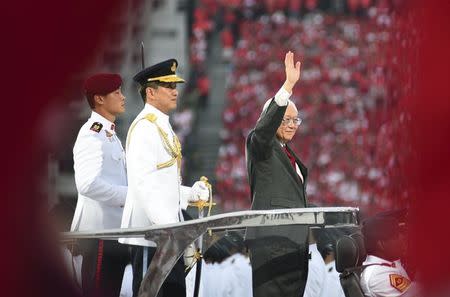Singapore calls early poll, riding birthday wishes as growth slows
By Saeed Azhar and Aradhana Aravindan SINGAPORE (Reuters) - Singapore will hold a general election on Sept. 11, more than a year before a deadline for the next polls, the government said on Tuesday, seen riding the feel-good factor of the city-state's 50th birthday amid slowing economic growth. Analysts have said the People's Action Party (PAP), founded by Prime Minister Lee Hsien Loong's father, the late Lee Kuan Yew and in power since six years before independence in 1965, will be keen to tap national pride the Aug. 9 celebrations generated and improve on its performance in the last election. In 2011, the PAP won its lowest ever share of the vote with many people unhappy about the high cost of living and immigration, issues that will again be at the forefront of campaign debates. The next general election had to be held by January 2017, but there had been speculation in the media and political blogs that it would be called early. "I called this general election to seek your mandate to take Singapore beyond SG50, into its next half century," Lee said on his Facebook page, referring to Singapore's 50th birthday. "More than that, you will be choosing the team to work with you for the next 15-20 years, and setting the direction for Singapore for the next 50 years." In the 2011 election, the PAP won 60 percent of the vote, down from 67 percent in 2006, even though it won 81 of the 87 parliamentary seats. "For the PAP, it will be about slowing down the political inroads that the opposition made in 2011," said Eugene Tan, associate professor of law at Singapore Management University. "The quest for a strong mandate is pervasive." The election also comes at a time when Singapore is seeing slowing economic growth. The government this month revised its official gross domestic product growth forecast for 2015 to 2.0-2.5 percent from 2-4 percent previously. The legacy of Lee Kuan Yew, Singapore's first prime minister, who died on March 23, will be fresh in the minds of voters and the PAP will be keen to convince people it is best placed to ensure Singapore's success over the next 50 years. "I would say the uncertain economic backdrop works into their (PAP's) hands," said Song Seng Wun, an economist at CIMB Private Banking. The elder Lee oversaw the city-state's rapid rise from a British colonial backwater to a global trade and financial centre and his death triggered a flood of tributes. In his lifetime, Lee drew praise for his market-friendly policies, but also criticism at home and abroad for his strict controls over the press, public protest and political opponents. Under Lee, political opposition and independent media were not allowed to flourish in the same way as the economy, a state of affairs that persists to this day. Singapore placed 153 out of 180 countries in the latest World Press Freedom Index. (Reporting by Saeed Azhar and Aradhana Aravindan; Editing by Nick Macfie)



